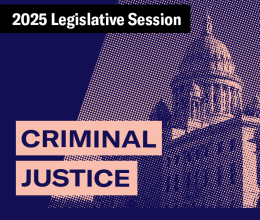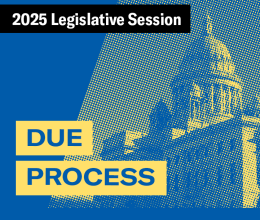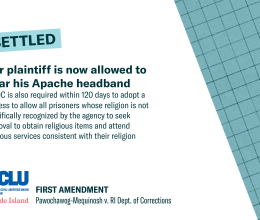
In Rhode Island, being a serial graffiti artist can get you a longer prison sentence than being a serial drunk driver; stealing fruit from a farm can get you a prison sentence five times longer than if you steal the same fruit from a supermarket; a felony drug conviction from your teenage past could prevent you from volunteering at your child’s school 20 years later; and you could face years in jail for advertising your drug store for a week without having a pharmacist available during business hours.
These are some of the troubling realities highlighted in a report released today by the ACLU of Rhode Island that examines state criminal laws and sentences. The groundbreaking report, entitled “Rhode Island’s Statehouse-to-Prison Pipeline,” takes an in-depth look at how overzealous lawmaking has resulted in an unfair, costly, and sometimes absurd criminal justice system in the State.
The result of more than a year of research, the report highlights a disturbing pattern of overcriminalization by the legislature that encourages mass incarceration and that fails to consider the severe collateral consequences that follow from an arbitrary and overzealous “tough-on-crime” approach to lawmaking.
Among the report’s findings:
- Between 2000 and 2017, the General Assembly created more than 170 new crimes, and increased prison sentences for dozens of existing offenses.
- Many of these “new” crimes make criminal offenses out of conduct that was already prohibited by existing laws, but add harsher penalties and lead to more serious consequences.
- Laws like these not only increase the punishments for people who commit certain offenses, they also vastly expand the power of police and prosecutors to coerce defendants to waive their right to a jury trial and prod innocent defendants to plead guilty.
- The length of prison sentences imposed by new laws is largely arbitrary.
- Increasing penalties that turn a crime from a misdemeanor into a felony, or establishing new felony crimes for many non-violent offenses, has serious collateral consequences beyond the length of the prison sentence that an offender faces.
“This report illustrates the clear fiscal, social, and pragmatic reasons that the ‘tough-on-crime’ approach makes no sense,” said Steven Brown, ACLU of RI executive director. “The time for lawmakers to embrace a smarter approach to crime is long overdue,” Brown continued.
The report makes a number of recommendations for addressing what it terms the “statehouse-to-prison” pipeline, including:
- Create a commission to recodify the criminal laws with the goal of reducing arbitrary penalties, eliminating duplicative crimes, and decriminalizing some offenses.
- Require prison impact statements with the introduction of sentencing bills so that the fiscal impact of such legislation cannot be ignored.
- Require racial impact statements to help reduce the significant racial disparities in the criminal justice system.
- Reclassify some crimes from felonies to misdemeanors, and reduce the passage of duplicative criminal laws and enhanced penalties for already-existing crimes.
- Re-examine and revise statutes that disqualify, automatically or presumptively, people with felony records from employment or professional licensing.
The report is part of the ACLU’s longstanding campaign to reform Rhode Island’s flawed criminal justice system and combat unnecessary criminal legislation that punishes too many people, too harshly, for too long. The report notes that the number of people incarcerated in the state per 100,000 residents has more than tripled since 1980.
The ACLU’s Brown added: “Overcriminalization and mass incarceration begin with lawmaking. The current ‘tough-on-crime’ approach is deeply flawed. It is time for a more reasonable, forward-thinking and systematic approach to the passage of laws creating new crimes and increasing penalties. Hopefully, this report will initiate this much needed discussion.”


